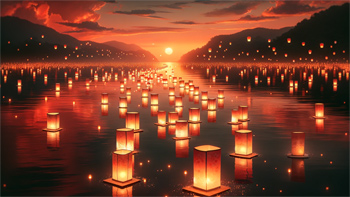Obon, or Bon Festival, is a traditional Japanese Buddhist custom that honors the spirits of ancestors. Celebrated in the middle of the summer, typically in July or August, Obon is a time for families to come together, visit ancestral graves, and participate in various rituals and festivities. This festival, deeply rooted in Buddhist beliefs and Japanese culture, is a blend of solemn observance and joyous celebration, reflecting the profound respect for family and ancestors in Buddhism. The following article explores the history, practices, and contemporary significance of Obon in the Buddhist tradition.
Origins and Historical Significance of Obon
The origins of Obon are found in the Buddhist tale of Mokuren (Maudgalyayana), a disciple of Buddha, who discovered that his deceased mother was suffering in the Realm of Hungry Ghosts. Buddha advised him to make offerings to the Buddhist monastic community. Upon doing so, his mother's spirit was freed, leading Mokuren to dance with joy. This story symbolizes the deep connection between the living and the deceased in Buddhism and underscores the importance of expressing gratitude and making offerings to one's ancestors. Over time, Obon evolved into a festival where all ancestors are remembered and honored.
Traditional Practices and Rituals
Obon involves various traditional practices and rituals. One key ritual is the cleaning and beautification of family graves, a sign of respect and care for the ancestors. Families also set up altars at home, offering food, incense, and flowers. Another central element of Obon is the Bon Odori, a traditional dance performed during the festival. The Bon Odori varies from region to region but generally involves people dancing in a circle, often around a central platform or tower. The dance is both a way to welcome the spirits of the ancestors and to celebrate their memory.
Food and Festivities
Food plays a significant role in Obon celebrations. Special dishes are prepared and offered both to the ancestors and shared among family and community members. These meals are often vegetarian, in line with Buddhist teachings of non-violence and compassion towards all beings. Lanterns are also a prominent feature of Obon, with families hanging lanterns outside their homes to guide the spirits. The festival typically concludes with Toro Nagashi, the floating of lanterns on rivers, lakes, or the sea, symbolizing the ancestral spirits' return to their world.
Obon in Different Buddhist Traditions
While Obon is primarily associated with Japanese Buddhism, similar festivals to honor the deceased are found in other Buddhist traditions across Asia. Each of these festivals has unique customs and practices, but all share the underlying theme of reverence and gratitude towards ancestors.
Contemporary Observances of Obon
In modern times, Obon continues to be an important cultural and spiritual event for Buddhists and non-Buddhists alike. It is an opportunity for family reunions and community gatherings. In many places, Obon festivals have become significant cultural events, featuring Japanese folk music, games, and traditional performances, attracting a broad audience. These contemporary celebrations maintain the festival's traditional essence while adapting to the changing times and contexts.
Obon's Significance in Daily Life
Obon extends beyond the festival period, influencing the daily lives and practices of those who observe it. It is a reminder of the impermanence of life and the interconnectedness of all beings. The festival encourages mindfulness, gratitude, and reflection on one's actions and their impact on others, both living and deceased. In this way, Obon serves as an annual occasion for spiritual reflection and reconnection with Buddhist values.
In essence, Obon is a profound cultural and spiritual festival that offers a unique blend of solemn remembrance and joyful celebration. It provides an opportunity for families to come together, honor their ancestors, and engage in traditional practices that reinforce the Buddhist teachings of compassion and gratitude. As a celebration that has adapted over centuries, Obon remains a vibrant and meaningful observance in contemporary society, deeply rooted in Buddhist tradition and cultural heritage.
